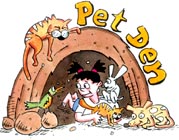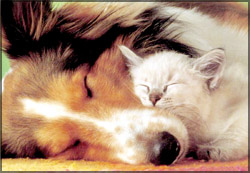Keeping your pet safe and healthy
 If
you or your family members suddenly fall sick or get injured while at
home, do you have a first aid kit to treat them? You would most probably
have one. But, if your pet gets injured, do you have a first aid kit or
do you know any first aid methods? Let's see what we should do when an
emergency arises regarding a pet. If
you or your family members suddenly fall sick or get injured while at
home, do you have a first aid kit to treat them? You would most probably
have one. But, if your pet gets injured, do you have a first aid kit or
do you know any first aid methods? Let's see what we should do when an
emergency arises regarding a pet.
A sick or injured animal is often in a frightened state, so if you
need to give emergency first aid, you would have to protect yourself
first (even if it's your own pet); cats can be handled with gloves or
wrapped in a blanket - a dog can be muzzled.
blanket - a dog can be muzzled.
Of course, before an emergency ever arises, it's a good idea to learn
all you can about first aid techniques and pet health care.
Never leave dangerous objects like pins, needles or fish hooks within
reach. Be well aware of your pet's normal behaviour, so you can
recognize when it's not normal.
Remember that the objective is to relieve their suffering... perhaps
even to save a life. Emergency first aid is most effective when rendered
quickly, but calmly.
Poisoning
Family pets (and other animals too) risk all kinds of poisoning in
many types of places.
Snakes and some plants can poison them; and also hundreds of
poisonous materials like pesticides, weed killers, acids, fertilisers
and paints, used around the home by people every day can harm them. The
list is endless. Here's what you can do if your pet is poisoned:
* Keep the animal warm and quiet
* Try to determine what the poison was, when it was ingested (taken
in), and the amount swallowed
* Immediately call your veterinarian.
If you decide to take the pet to your veterinarian, take the
container (or the label) with you. Most of the time, poisoning is
accidental. Keep poisonous materials out of reach, know what your pet is
doing at all times, and keep emergency telephone numbers handy.
Heatstroke
Heatstroke may kill or seriously injure your pet, but it can easily
be avoided. Never leave pets in cars on warm days; exercise them during
the cool part of the day; look out for rapid breathing, loud wheezing or
signs of going into shock.
Professional help may be needed, but in the meantime, quickly get the
animal to a shady ventilated area, and sponge off with cool water.
Flea season
As a loving pet owner, you'd do anything to prevent your cat or dog
from suffering. After all, they're part of the family. Yet, every year,
when the flea season begins, they start suffering. Fleas bite, and the
scratching and chewing starts. It's a painful and irritating routine for
you and your pet. But that's only the beginning.
Adult fleas latch on to your cat or dog. They bite your pets and feed
on their blood. Then the fleas produce eggs. Eggs drop from your pet to
the ground or carpets. Over time, the eggs develop into adult fleas. And
the cycle starts all over again.
Adult fleas on your pet can actually cause serious medical problems -
like flea allergy dermatitis or tapeworms, and in some extreme cases,
anaemia. Flea-related diseases account for more than 50 per cent of
dermatologic (skin diseases) cases presented to veterinarians.
When to start treatment
Ideally, flea control should begin as flea prevention - before the
flea season starts. Depending on which part of the country you live in,
your flea season can last for four months or it can be a year-long
problem.
Where to turn
If you are in the midst of the flea season and have problems with
fleas, do not despair. Your veterinarian is a flea expert and can advise
you on the latest products that kill adult fleas, eggs and larvae, and
also take care of fleas in your environment.
They will base their recommendation on your regional weather
conditions (high humidity and heat means more fleas on the way), your
pet's health and the level of flea infestation (spreading).
Compiled by Janani Amarasekara |
